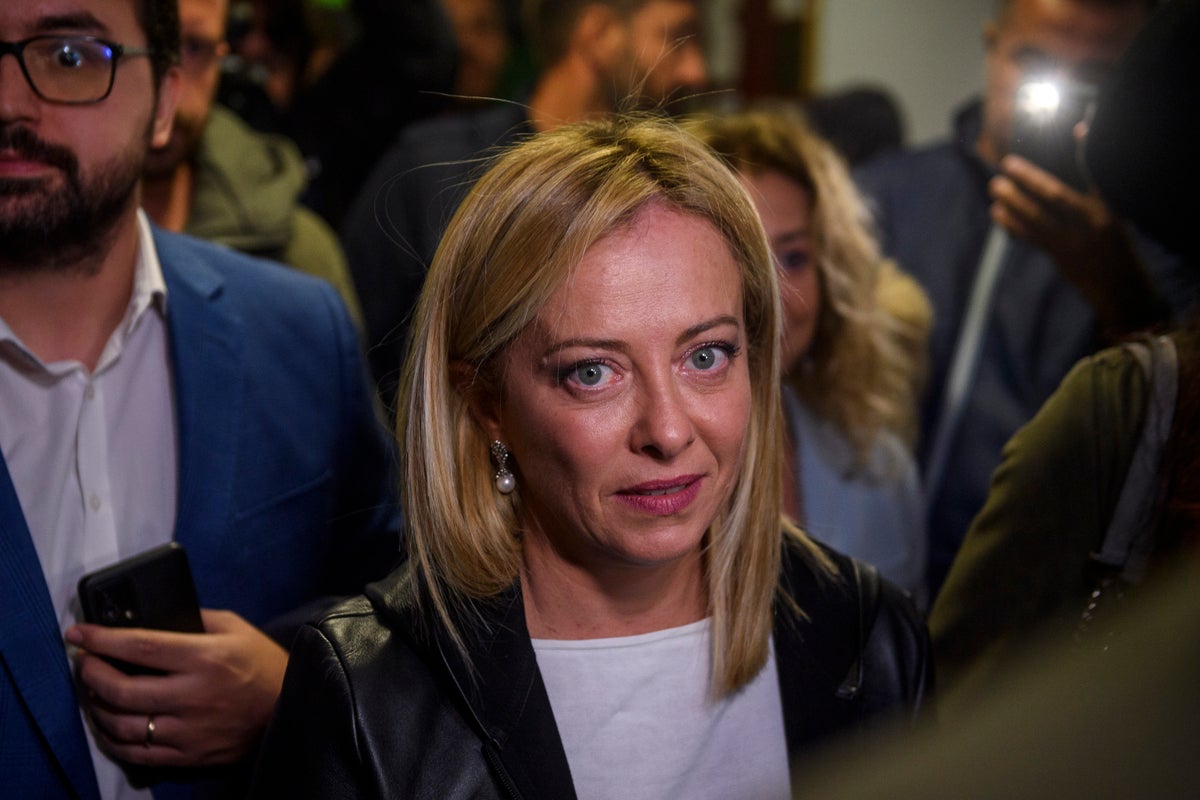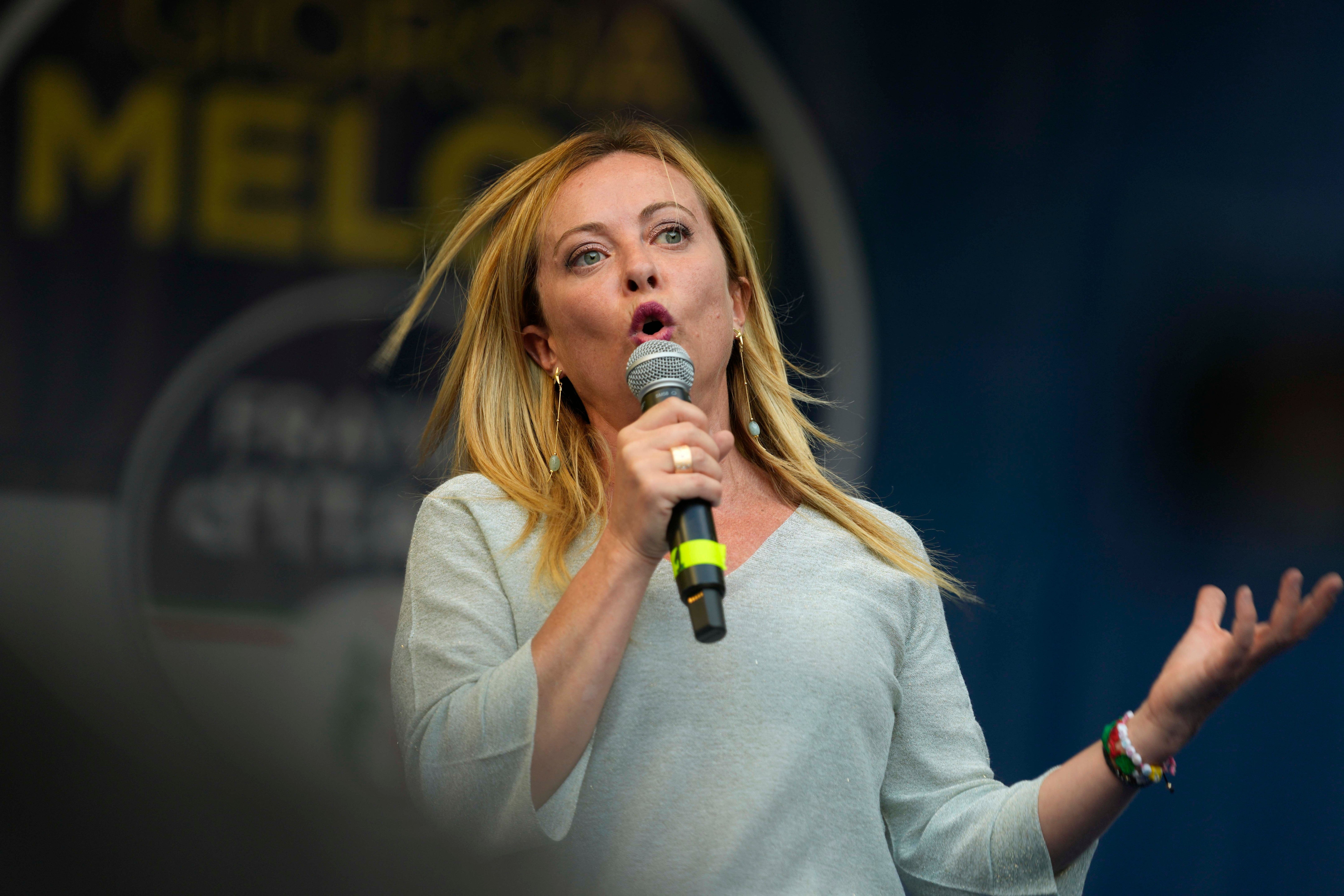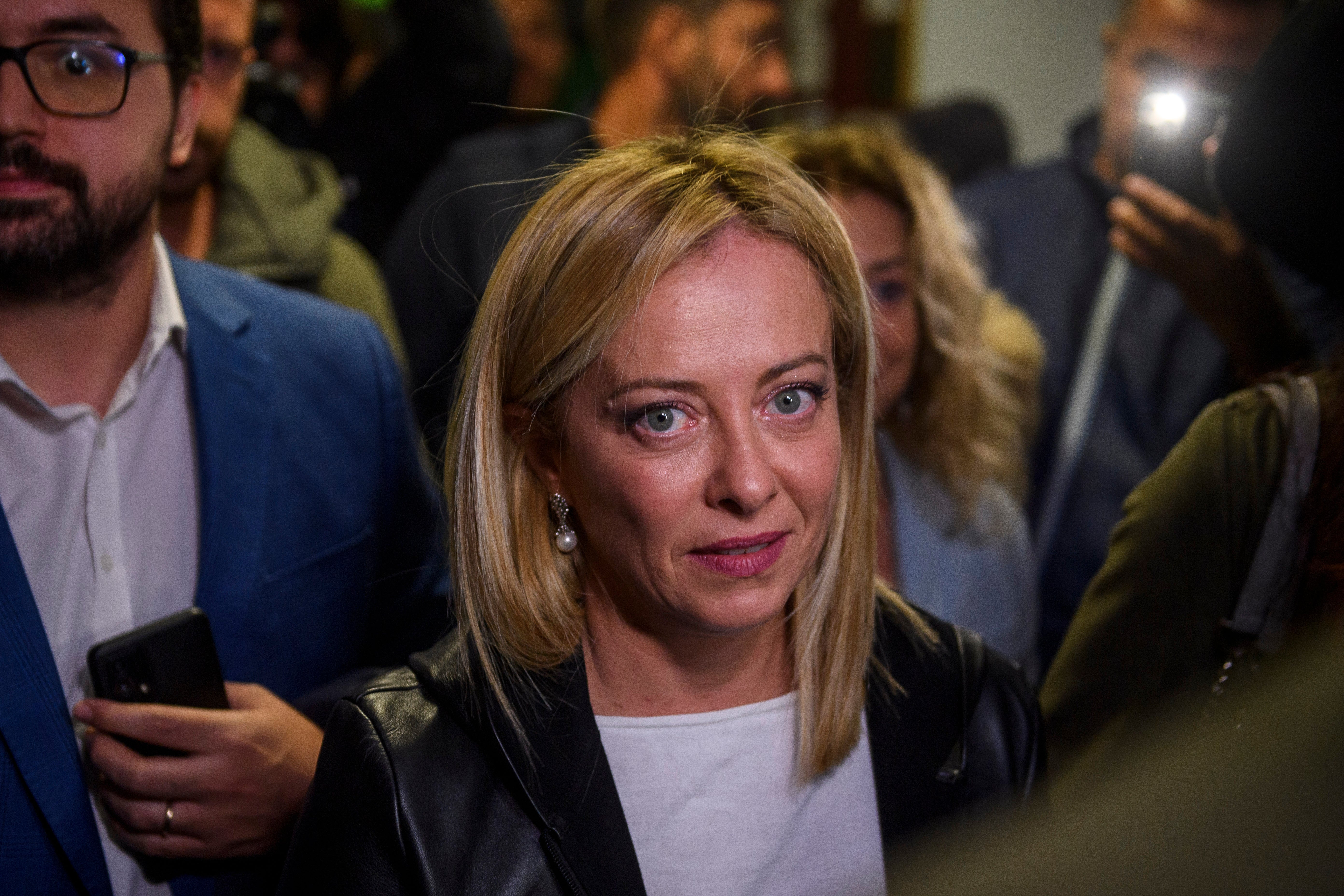
She is the history woman.
Giorgia Meloni is set to become Italy’s first female prime minister after her right-wing coalition secured 44 per cent of the vote in the country’s general election on Sunday, giving it control over both houses of parliament.
Ms Meloni, 45, leads the hard-right party Brothers of Italy, which has allied with former PM Silvio Berlusconi’s Forza Italia and ex-interior minister Matteo Salvini’s far-right group The League to oust Mario Draghi’s unity coalition government.
Proclaiming victory from her party’s Rome headquarters in the early hours of Monday morning, Ms Meloni vowed to unite country, declaring: “If we are called to govern this nation, we will do it for everyone, we will do it for all Italians and we will do it with the aim of uniting the people.
“It is a victory I want to dedicate to everyone who is no longer with us and wanted this night. Italy chose us. We will not betray it as we never have.”
Although Ms Meloni herself rejects the term “far-right” and insists Italian fascism was consigned to the history books with the death of dictator Benito Mussolini in April 1945, her party still flies the tricolour flame and her government will be Italy’s most hard-line since the Second World War.
An admirer of Hungarian autocrat Viktor Orban, she promotes what she considers to be traditional, Christian family values and has denounced LGBT+ rights, opposed abortion, euthanasia and migration from outside Europe, even calling for a naval blockade to prevent refugee boats leaving Libya to cross the Mediterranean.
She has also dabbled in conspiracy theories, warning of “ethnic substitution” and a “globalist” international left.
In better news for Europe, she has been forced to row back her previous calls for closer ties with Vladimir Putin’s Russia and to decry his war in Ukraine, pledging to continue the shipment of Italian weapons to Kyiv should she be invited to form a government, although recent comments by Mr Berlusconi sympathetic to Mr Putin have provided fresh cause for concern.
Giorgia Meloni was born on 15 January, 1977 and raised in Garbatella, a working-class district in the south of Rome, historically left-wing in its outlook.
Her father Francesco, a tax adviser and lefitst originally from Sardinia, walked out on the family when his daughter was just 11, leaving her mother Anna, a romance novelist, to raise her while he relocated to the Canary Islands, an upheaval many armchair psychologists have suggested explains Ms Meloni’s unexpected lurch to the right.
They have also pointed to the fact that she was taunted by bullies at school, who called her “fatso” and excluded her from playground volleyball games, motivating her to lose weight and prove the “rednecks” wrong.
In 1992, when she was 15, Ms Meloni joined the Youth Front, the junior wing of the neo-fascist Italian Social Movement (Movimento Sociale Italiano, MSI), itself born from the ashes of Mussolini’s legacy.
Four years later, she graduated high school – how honest she has been subsequently about her academic record is the subject of some suspicion – and became national leader of Student Action, the youth movement of the conservative National Alliance (Alleanza Nazionale, AN), successor to the MSI.
In 1998, she was elected as a councillor of the Province of Rome, holding the position until 2002 while also working as a nanny, waitress and bartender at Rome’s famous Piper Club.
In 2004, she became the first female president of Youth Action, AN’s youth wing. By now a rising star of Italian right-wing politics, Mr Berlusconi appointed her to his fourth Cabinet in 2008, in which she served as minister of youth and sport, setting another political record by being the youngest minister in the history of united Italy at just 31.

When the flamboyant media mogul was once again forced from power by a corruption scandal and mass protests in November 2011, Ms Meloni took matters into her own hands, teaming up with Ignazio La Russa and Guido Crosetto to found the anti-immigration Brothers of Italy (Fratelli d’Italia, FdI) in December 2012, their party taking its name from the opening line of the Italian national anthem.
She became the FdI’s president in March 2014 but was unsuccessful in the 2014 elections to the European Parliament and again in the 2016 Rome municipal election, where she stood as a mayoral candidate while pregnant.
Her party won just four per cent of the vote in Italy’s 2018 election but has since profited from anti-establishment resentment in lockdown, northern Italy having been particularly hard hit by the coronavirus when the disease first arrived in Europe in the opening months of the global pandemic and by the surge in right-wing populist politics around the world, which has seen the likes of Donald Trump, Jair Bolsonaro and Marine Le Pen foster mass support.

Ms Meloni has capitalised on dissatisfaction with the reigning Draghi administration to grow her own profile, speaking at conferences for Vox, Spain’s far-right party, befriending Poland’s Law and Justice Party and addressing the Conservative Political Action Conference in Florida in February this year as part of a strategy to cement an international alliance of like-minded groups.
Ms Meloni’s partner is journalist Andrea Giambruno, who works for Mr Berlusconi’s Mediaset channel, with whom she has a daughter.
She is known for her love of fantasy fiction, particularly JRR Tolkein’s The Lord of the Rings (1954-55) and Michael Ende’s The Neverending Story (1979), so much so that she reportedly attended “Hobbit Camp” as an adolescent and sang with a folk group called “Compagnia dell’Anello” (The Fellowship of the Ring).







